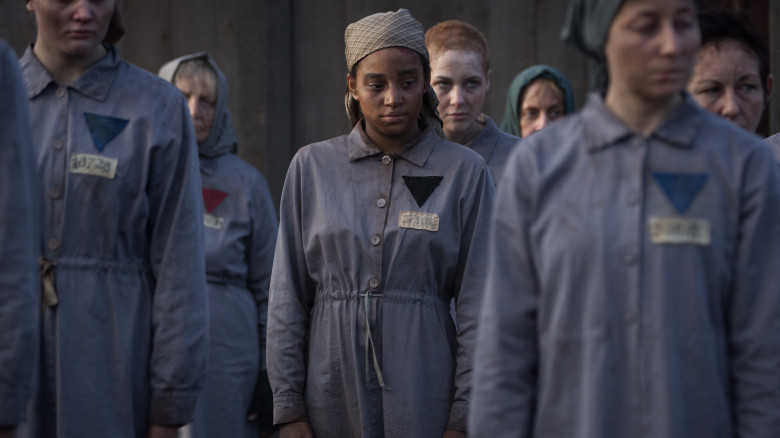WHERE HANDS TOUCH
Vertical Entertainment
Reviewed by: Harvey Karten
Director: Amma Asante
Screenwriter: Amma Asante
Cast: Amandla Stenberg, George MacKay, Abbie Cornish, Christopher Eccleston, Tom Sweet
Screened at: Critics’ link, NYC, 8/24/18
Opens: September 9, 2018 at Toronto Film Festival
Once you get past the absurdity of Germans’ speaking only English in a film that has a little French spoken in the final scene, you realize that this Holocaust story is one that to my knowledge had never before been explored. “Where Hands Touch” examines the life of 15-year-old Leyna (Amandla Stenberg) who comes of age by having her first sexual experience with an “Aryan” member of the Hitler Youth. To the young woman’s discredit, she does not have a problem with her liaison with Lutz (George MacKay), a young man who does not try to get off the hook by pretending that every kid had to accommodate himself to the Nazi program and join the organization. He is so loyal to the Nazi regime that time and again states that he might even try to be assigned to the Russian front, and who is protected by his father (Christopher Eccleston) who assigns him to work in a concentration camp.
For her part, Leyna is protected from persecution, at least for a time, by her mother (Abbie Cornish), an “Aryan” German who had had a relationship with an African, thereby producing a mixed-race child.
Amma Asante, a London-based actor, screenwriter, and director who was awarded the MBE (Member of the Order of the British Empire) in the 2017 Queen’s Birthday Honours List for her services to Film, is known by her fans largely for her 2004 film “A Way of Life.” That story is about a 17-year-old girl who is paranoid that a Turkish neighbor is plotting to take away her 6-months’ old baby. Asante, therefore, is in her métier by this lataest story requires no paranoia to realize that Leyna is really in serious trouble. Her mother is sensible, as mothers often are when dealing with their daughters’ passions, doing her best to have her daughter fade into invisibility. That she is having an affair with a die-hard Nazi troubles her, while her daughter, passion trumping rationality, plunges headline into danger.
So much is known about the Nazi persecution of Jews that we overlook the fact that Afro-German professionals found it almost impossible to work in Germany under Hitler. They were forbidden to have sexual relations and marriage to Aryans, they were called “Rhineland bastards,” and were subjected to undergo forced sterilization. Yet they were better off than Jews and Romani, segregated with a plan to make them disappear by having the 25,000 women of color disappear after the present generation.
“Where Hands Touch” does give us insight into the Holocaust as it applies to women who are not Jews but whose papers were somehow not in order. In the situation here, Leyland’s mother is taken away for producing a mixed race child while her daughter is confined to a concentration camp located not far from a neighboring facility where Jews are murdered and sent up in smoke.
The film bills itself not particularly as a coming-of-age story, though Leyland’s virginity is lost and the girl is made pregnant by her Nazi lover. Instead, I believe the writer-director wants us to look at the work as principally a romance, albeit a love affair dominated by the political and social order of 1944-1945. The film has received some backlash, including a screed by Tara Nafisa, a Nigerian critic who is incensed that we are “expected to develop a special bond with a mixed-race girl who sees past the blood in his hands, the emblems on his uniforms, and the philosophy of the association he represent.” However let’s face facts. Leyland, who is the principal character, is not meant to be a shining example of a caring, compassionate woman, but is rather limited by her tender age, driven by passions that her mother fears. In the same sense, her young man, despite his love of Germany, partially to overlook his ideology, which would make similar people avoid and even denigrate women of mixed race. He is willing to risk his standing with the society of his day and become alienated from his father. There are no saints in this story with the possible exception of the girl’s mother, but rather a basket of flawed personalities, some, like the boy’s father, who would fit easily into a basket of deplorables. The same could, of course, be said of the extras, the Nazi officers who bark orders, demand right and left that citizens produce papers, shooting some in the back as easily as they could put a hook on a fish.
Ultimately the picture is flawed by a script that is both saccharine and simplistic, the British actors delivering their lines in a stilted manner. The dialogue between Leyland’s mom and the girl, and between the Aryan and her father could remind us of the long-winded advice that Shakespeare’s Polonius gives to Laertes, but there is nothing in the conversations that transcends the banal.
So give Ms. Asante the credit for exposing us to a segment of the Holocaust not before treated in a film that, despite being based on a true story, does not come across as credible. Remi Adefarasin films in Belgium, moments of melodrama aided by Ann Chmelewsky’s music.
Rated R. 122 minutes. © 2018 by Harvey Karten, Member, New York Film Critics Online
Story – C
Acting – C+
Technical – B-
Overall – C+






